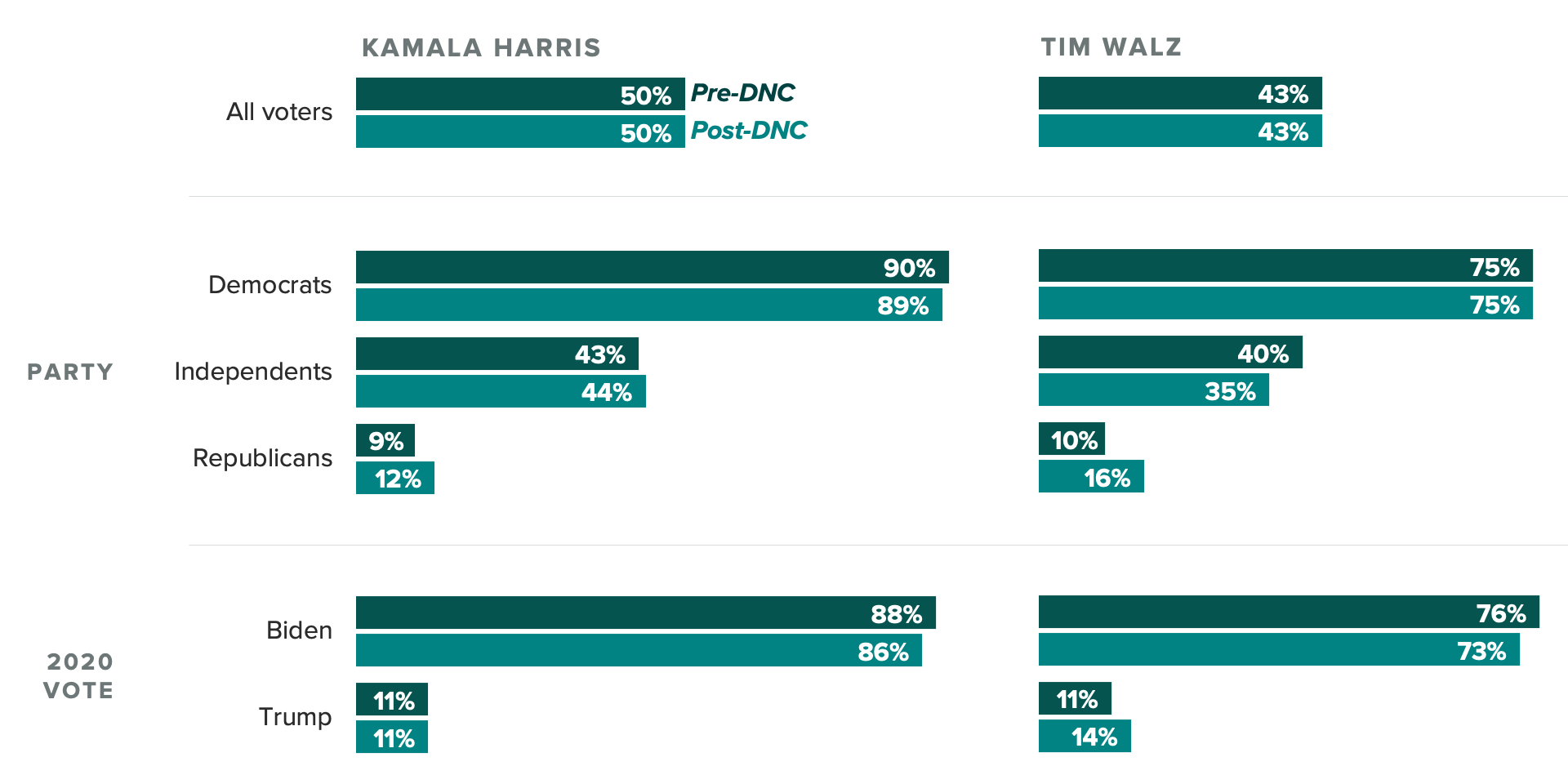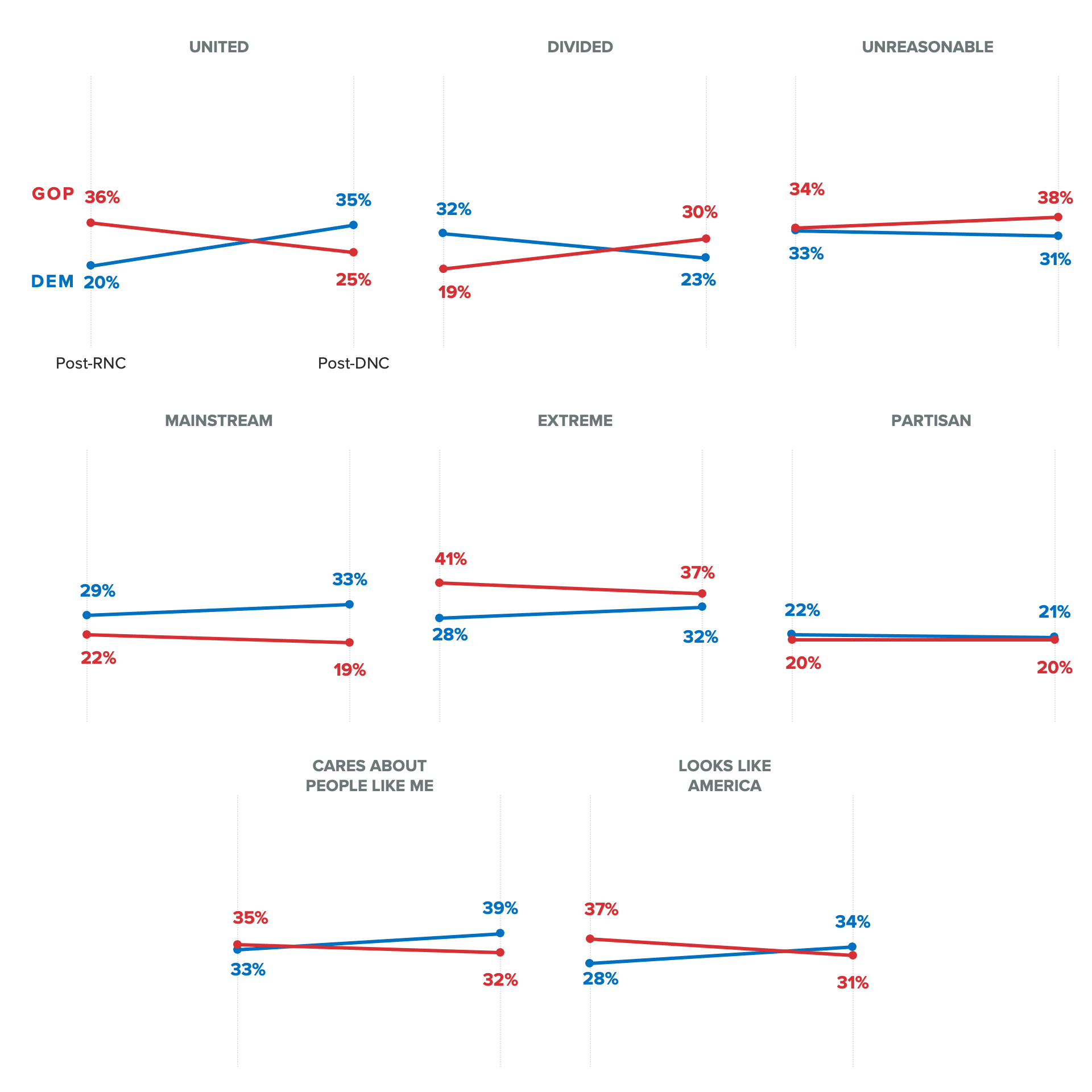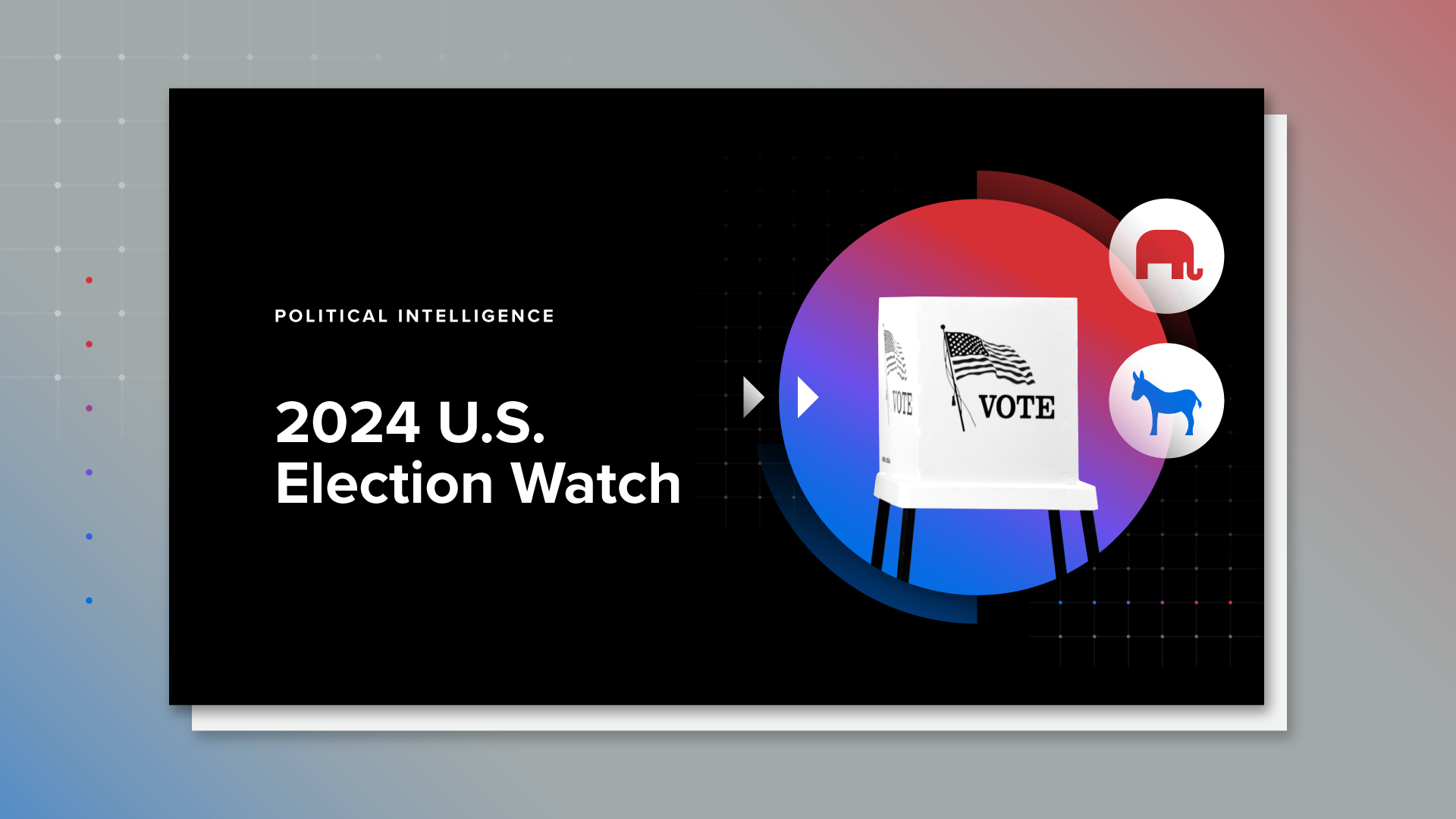No Convention Bump for Harris, Who Nonetheless Remains in the Driver’s Seat

Key Takeaways
Vice President Kamala Harris leads former President Donald Trump by 4 percentage points following the Democratic National Convention (48% to 44%), matching her standing before the weeklong confab in Chicago.
Since late June, the share of voters who say the word “united” better describes the Democratic Party than the Republican Party has increased from 20% to 35%, while the share who say the opposite has decreased from 36% to 25%.
While ratings data indicates more viewers tuned into the DNC than the RNC throughout each gathering, our survey suggests the extent to which these partisan confabs break through to the broader electorate is limited: Among eight convention-centric items tested, only three news events — speeches from Harris, former first lady Michelle Obama and former President Barack Obama — broke through to a majority of voters.
Data Downloads
Pro+ subscribers are able to download the datasets that underpin Morning Consult Pro's reports and analysis. Contact us to get access.
Sign up to get the latest data and analysis on how business, politics and economics intersect around the world.
The Democratic National Convention hasn’t padded Vice President Kamala Harris’ advantage over her Republican opponent for the 2024 presidential race, but it has left more voters satisfied with the Democratic ticket than the alternative as the campaign kicks into high gear.
Morning Consult’s latest tracking of the 2024 presidential contest conducted fully after the Democratic Party’s four-day gathering in Chicago found Harris with a 4-percentage-point lead over former President Donald Trump (48% to 44%), identical to our data collected in advance of the convention.
Harris gets no immediate boost from DNC

Harris continues to be backed by roughly 9 in 10 voters who voted for President Joe Biden in 2020, has held onto her advantage among voters younger than 45 years old and is maintaining her narrow lead among independent voters. The Democratic nominee also held on to her wide advantage over Trump among Black voters (72% to 19%), and has a more narrow lead among women (49% to 42%), both of which went unchanged outside the surveys’ margins of error.
The lack of movement on vote choice is mirrored by other trends we’ve tracked during the 2024 cycle.
Post-DNC, more voters remain satisfied with the Democratic ticket

According to the latest survey, half of voters are satisfied with Harris as the Democratic Party’s 2024 standard-bearer, while 43% said the same of Minnesota Gov. Tim Walz’ place as the party’s vice-presidential nominee. Democrats and Biden’s 2020 voters remain more likely than Republicans and Trump’s 2020 backers to express satisfaction in the top of their ticket, with virtually no real movement over the past couple weeks on either side of the political aisle.
While views about the candidates themselves remained largely stagnant following the DNC, it’s also clear that things have changed drastically since the end of the Republican National Convention, when Democrats were beset by infighting that preceded Biden’s decision to not run for re-election and pave the way for Harris’ ascension.
Post-DNC, the Democratic Party largely looks better to voters

Since late June, the share of voters who say the word “united” better describes the Democratic Party than the Republican Party has increased from 20% to 35%, while the share who say the opposite has decreased from 36% to 25%.
Voters are also slightly more likely to say the Democratic Party “looks like America” and cares about people like them in the wake of the DNC, while the opposite was true after the RNC in June.
We also tested an emerging attack line from Democrats that Walz brought to the national conversation ahead of his elevation to the party’s ticket: that Republicans are “weird.”
Voters are slightly more likely to think the GOP is weird

Voters are only slightly more likely to say “weird’ better describes the Republican Party than the Democratic Party, 34% to 29%, suggesting that the rhetorical jab has yet to catch fire beyond the confines of liberal corners of social media.
Democrats’ small advantage on the question is driven by their own voters, who are slightly more likely than GOP voters to say that word better describes the other party. The branding effort also appears to be resonating better with nonwhite voters, especially Black voters, who are 35 points more likely to view the GOP as weird than the Democratic Party — the largest gap along racial or ethnic lines.
While ratings data indicates more viewers tuned into the DNC than the RNC throughout each gathering, our survey suggests the extent to which these partisan confabs have broken through to the broader electorate is limited.
DNC speeches from Harris, Obamas broke through to most voters

Among eight convention-centric items tested, only three news events tested over the weekend — convention speeches from Harris, former first lady Michelle Obama and former President Barack Obama — broke through to a majority of voters.
Harris’ acceptance speech topped the list, with 56% saying they heard at least “some” about it, and only 27% saying they’d heard “a lot.”
While the convention’s most memorable moments may have been more of a ripple than a splash with the country’s voters, it’s also true that the gathering’s hairier moments did not register widely: Only about 1 in 10 voters said they heard “a lot” about demonstrations by pro-Palestinian protesters and the denial of a speaking slot for the leaders of the pro-Palestinian Uncommitted National Movement.
The bottom line
While our head-to-head surveys show no boost in Harris’ support following the weeklong infomercial for her and her party, two things appear to remain true: it’s the Democratic nominee’s race to lose, and that would certainly not be the case were Biden still in the race. Our weekly tracking shows Harris and Walz continue to be more popular than not, and face a remarkably positive news environment, offering a stark contrast with the popularity of the Republican ticket and Biden.
Eli Yokley is Morning Consult’s U.S. politics analyst. Eli joined Morning Consult in 2016 from Roll Call, where he reported on House and Senate campaigns after five years of covering state-level politics in the Show Me State while studying at the University of Missouri in Columbia, including contributions to The New York Times, Politico and The Daily Beast. Follow him on Twitter @eyokley. Interested in connecting with Eli to discuss his analysis or for a media engagement or speaking opportunity? Email [email protected].
Cameron Easley is Morning Consult’s head of political and economic analysis. He has led Morning Consult's coverage of politics and elections since 2016, and his work has appeared in The New York Times, The Wall Street Journal, The Washington Post, Politico, Axios, FiveThirtyEight and on Fox News, CNN and MSNBC. Cameron joined Morning Consult from Roll Call, where he was managing editor. He graduated from the University of North Carolina at Chapel Hill. Follow him on Twitter @cameron_easley. Interested in connecting with Cameron to discuss his analysis or for a media engagement or speaking opportunity? Email [email protected].

